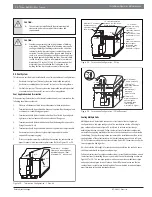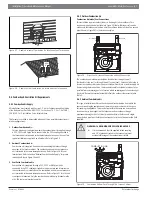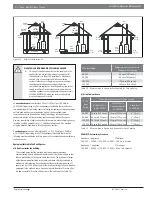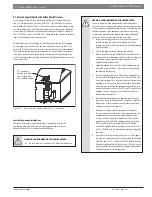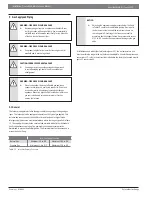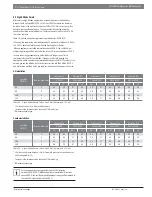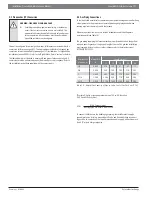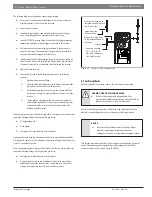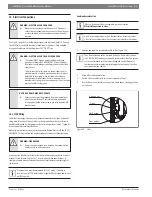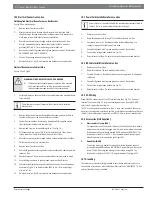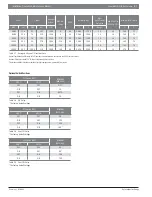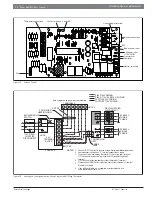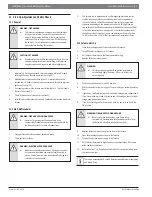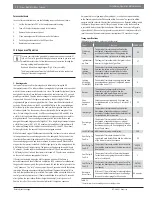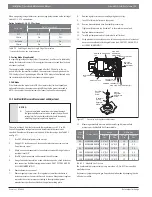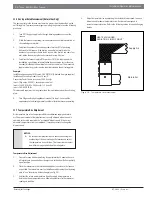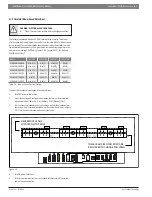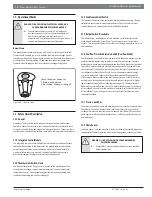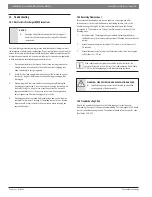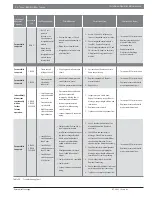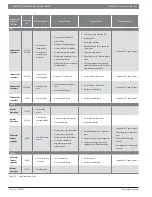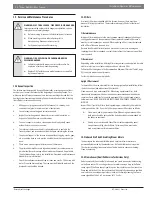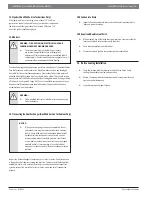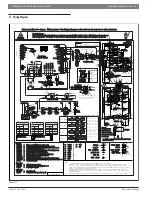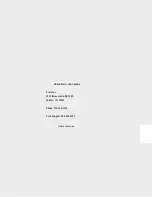
4 4 |
E
coer
96%
A
F
UE
Gas Furnace
Installation, Operation & Maintenance
07-2021
|
E
coer
I
nc
.
Data subject to change
Furnace shutdown
In case of furnace malfunction, use the following steps to shut the unit down:
1.
Set the thermostat to OFF or it's lowest temperature setting.
2.
Turn off the electrical power supply to the furnace.
3.
Remove the burner access panel.
4.
Close manual gas shutoff valve external to the furnace.
5.
Push the gas valve switch to the OFF position.
6.
Replace burner access panel.
11.4 Sequence of Operation
Furnace control must be grounded for proper operation or control will
lock out. Control is grounded through green wire routed to gas valve and
manifold bracket screw. Follow the sequence of operation through the
heating, cooling, and fan only modes.
Read and follow the wiring diagram (Fig. 36) very carefully.
The blower access panel must be installed for power to be conducted
through all electrical components.
1. Heating mode
In a typical system, a call for
fi
rst stage heat is initiated by closing the W1
thermostat contacts. The inducer blower is energized at high speed and the control
waits for the low pressure switch contacts to close. The humidi
fi
er (optional) is also
energized at this time. Once the low pressure switch contacts close, a 15-second
pre-purge is initiated. Then the inducer changes to low speed and the 120V ignitor
is powered. At the end of the ignitor warm-up time, the
fi
rst stage of the two-
stage manifold gas valve is energized (low
fi
re). Flame must be detected within 4
seconds. If
fl
ame is detected, the 45-second HEAT delay-to-fan-on period begins.
After the delay-to-fan-on period ends, the control will energize the circulator fan
at low heat speed. The electronic air cleaner (optional) will also energize at this
time. For a two-stage thermostat, a call for second stage heat (W1 and W2) after
a call for
fi
rst stage heat will energize the inducer at high speed and the circulator
at high heat speed. The second stage pressure switch contacts will close and
energize the second stage gas valve (high
fi
re). For a single-stage thermostat, when
a call for heat occurs (W1), a 10, 20 minute or auto mode heat staging timer will
be activated (timing is selectable with option switches S1-1 and S1-2 positions).
Following this delay, the second stage heat is energized as above.
When the second stage of the thermostat is satis
fi
ed, the inducer motor is reduced
to low speed and the second stage gas valve is de-energized. On the control, the
circulator will remain at high heat speed for 30 seconds following the opening of
the second stage gas valve and then is reduced to low heat speed. When the
fi
rst
stage of the thermostat is satis
fi
ed, the
fi
rst stage gas valve is de-energized and the
HEAT delay-to-fan-off begins timing. The inducer will postpurge for an additional
15 seconds, then the inducer and humidi
fi
er will turn off. Upon completion of the
HEAT delay-to-fan-off period, the circulator is turned off. The electronic air cleaner
on the control is also de-energized at this time.
If
fl
ame is not detected during the trial-for-ignition period or if the
fl
ame is
detected/sensed and then lost before completion of 10 seconds of establishment,
the gas valve is de-energized, the ignitor is turned off, and the control goes into the
“retry” sequence. The “retry” sequence provides a 60-second wait with the inducer
interpurge following an unsuccessful ignition attempt (
fl
ame not detected). After
this wait, the ignition attempt is restarted. Two retries will be attempted before the
control goes into system lockout. If
fl
ame is established for more than 10 seconds
after ignition, the controller will clear the ignition attempt (or retry) counter. If
fl
ame is lost after 10 seconds, the control will restart the ignition sequence.
A momentary loss of gas supply,
fl
ame blowout, or a shorted or open condition
in the
fl
ame probe circuit will be sensed within 2 seconds. The gas valve will de-
energize and the control will restart the ignition sequence. Recycles will begin and
the burner will operate normally if the gas supply returns, or the fault condition
is corrected, before the last ignition attempt. Otherwise, the control will go into
system lockout. If the control has gone into system lockout, it may be possible to
reset the control by a momentary power interruption of 10 seconds or longer.
Timing speci
fi
cations
(All times are in seconds, unless noted otherwise)
Event
De
fi
nition
50M58-400
Pre-purge
Time
The period of time intended to allow for the
dissipation of any unburned gas or residual
products of combustion at the beginning of a
furnace operating cycle prior to initiating ignition
15
Ignitor Warm-
up Time
The length of time allowed for the ignitor to heat
up prior to the ignition of gas
fl
ow.
17
Trial for
ignition
Period(TFI)
The period of time between initiation of gas
fl
ow and the action to shut off the gas
fl
ow in
the event of failure to establish proof of the
supervised ignition source or the supervised
main burner
fl
ame.
4
Ignition
Activation
Period(IAP)
The period of time between energizing the main
gas vale and deactivation of the ignition means
prior to the end of TFI
3
Retries
The additional attempts within the same
thermostat cycle for ignition when the
supervised main burner
fl
ame is not proven
within the
fi
rst trial for ignition period.
2 times
Valve
Sequence
period
Value sequence period equals 4 seconds trial
for ignition period x (1 initial try + 2 r12
seconds.
12
Inter-purge
The period of time intended to allow for the
dissipation of any unburned gas or residual
products of combustion between the failed trial
for ignition and the retry period.
60
Post-purge
Time
The period of time intended to allow for the
dissipation of any unburned gas or residual
products of combustion at the end of a furnace
burner operating cycle, Post-purge begins at the
loss of
fl
ame sense.
15
Lock-Out Time ANSI standard rated module timing.
300
Heat Delay-To-
Fan-On
The period of time between proof of the
supervised main burner
fl
ame and the activation
of the blower motor at heat speed.
30
Heat Delay-To-
Fan-Off*
The period of time between the loss of a call for
heat and the deactivation of the blower motor at
Heat speed.
*90/120/
150/180
Cool Delay-To-
Fan-On
The period of time after a thermostat demand
for cool before energizing the circulator blower
motor at cool speed.
1
Cool Delay-To-
Fan-Off
The period of time between the loss of a call for
cool and the deactivation of the blower motor at
cool speed.
60/*90/
120/150
Automatic
Reset Time
After one (1) hour of internal or external lockout,
the control will automatically reset itself and go
into an auto restart purge for 60 seconds.
60 minutes
Table 21
* These times will vary depending on option switch position.

